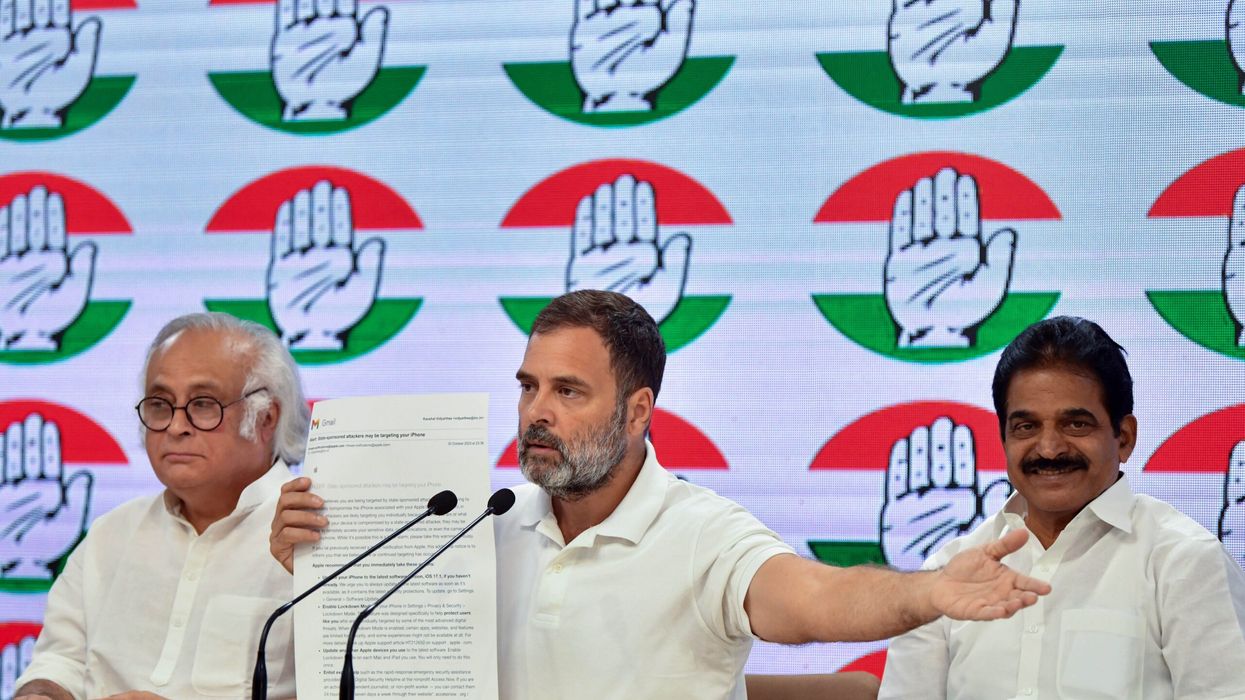INDIAN opposition leader Rahul Gandhi on Tuesday (31) accused prime minister Narendra Modi's government of trying to hack into senior opposition politicians' mobile phones, after they reported receiving warning messages from Apple.
Some of the lawmakers shared screenshots on social media of a notification quoting the iPhone manufacturer as saying: "Apple believes you are being targeted by state-sponsored attackers who are trying to remotely compromise the iPhone associated with your Apple ID".
"Hack us all you want," Gandhi told a news conference in New Delhi, in reference to Modi. "But we (opposition) will not stop questioning you."
At least five opposition leaders claimed to have received messages from Apple.
Trinamool Congress MP Mahua Moitra, Shiv Sena (UBT)'s Priyanka Chaturvedi, Congress MP Shashi Tharoor and his party's media and publicity department head Pawan Khera and Aam Aadmi Party's Raghav Chadha shared the screenshots on X.
"Received text and email from Apple warning me that the government trying to hack into my phone and email. @HMOIndia -- get a life. Adani and PMO bullies - your fear makes me pity you," Moitra said sharing the screenshots.
Tagging Chaturvedi to the post, she claimed that three other leaders of the opposition INDIA alliance have received similar messages.
Chaturvedi also shared a similar screenshot which she claimed to have received from Apple and said, "Wonder who? Shame on you. Cc: @HMOIndia for your kind attention".
Replying to Moitra's post, she said, "So not just me but also @MahuaMoitra has received this warning from Apple. Will @HMOIndia investigate?"
Tharoor also shared a post about him receiving a similar message. "Received from an Apple ID, threat-notifications@apple.com, which I have verified. Authenticity confirmed. Glad to keep underemployed officials busy at the expenses of taxpayers like me! Nothing more important to do?" he said on X, tagging the Prime Minister's Office, the Congress party chief Mallikarjun Kharge and Rahul Gandhi.
Information Technology minister Ashwini Vaishnaw expressed concern at the lawmakers' statements and said the government had asked Apple to join its investigation into the matter.
The ruling Bharatiya Janata Party (BJP) said it is for Apple to clarify the alerts it has sent to several people, including opposition leaders, about "state-sponsored attackers trying to remotely compromise" their iPhones. It also rejected the allegations against the government as "baseless and false".
Party leader and former minister Ravi Shankar Prasad told reporters that instead of levelling allegations against the government, these leaders should take up the matter with Apple and file FIRs.
He, however, cited his experience to claim that no telephone company does something like this and goes to CERT-In, an emergency response team, first to look into the matter.
Asked about the opposition leaders' charge, Prasad shot back, "It is for Apple to clarify. They should file an FIR if they have any problem. Who is stopping them?"
He recalled the controversy over the alleged use of Pegasus malware to hack into the phones of certain people, including opposition leaders, and said Rahul Gandhi had refused to deposit his iPhone before a committee appointed by the Supreme Court to look into the matter.
Meanwhile Apple said it did not attribute the threat notifications to "any specific state-sponsored attacker".
State-sponsored attacks were evolving over time. Detecting them "relies on threat intelligence signals that are often imperfect and incomplete," it said. "It's possible that some Apple threat notifications may be false alarms, or that some attacks are not detected,"
Jairam Ramesh, spokesperson for Congress party, called Apple's clarification a "long-winded non-denial" of a security breach.
In 2021, India was rocked by reports that the government had used Israeli-made Pegasus spyware to snoop on scores of journalists, activists and politicians, including Gandhi.
The government has declined to reply to questions whether India or any of its state agencies had purchased Pegasus spyware for surveillance.
(Agencies)





